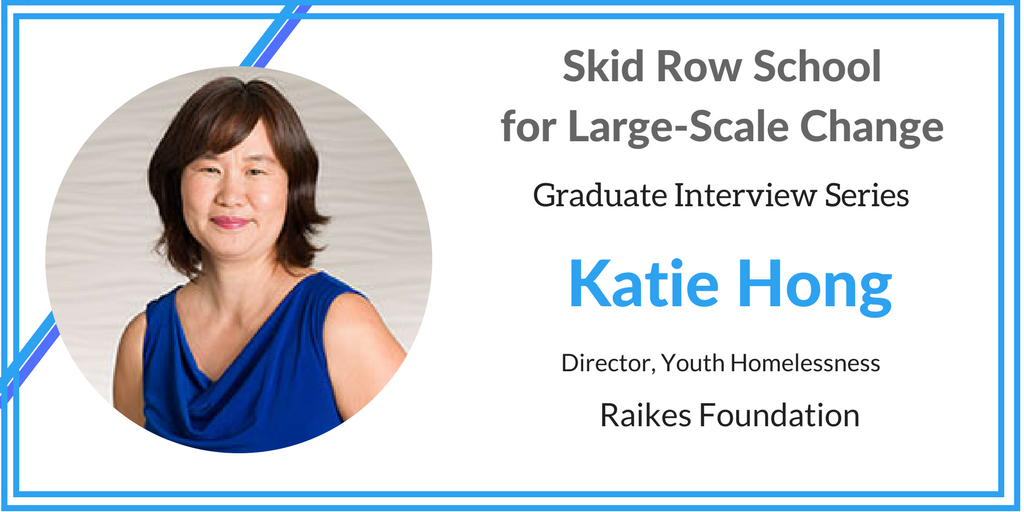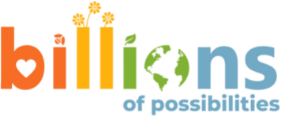
Meet Katie Hong, a director at the Raikes Foundation. She leads the foundation’s efforts to prevent and end youth and young adult homelessness and supports its national education strategy.
What is the core/heart of the Raikes Foundation’s intervention?
We want to see youth and young adult homelessness ended in this country. That means we aspire to see a future where youth and young adult (YYA) homelessness is a rare occurrence but if it happens, it is also a brief and one-time occurrence. Young people, who are struggling with the crisis of homelessness should not be forced to sleep outdoors or in places not meant for human habitation because communities don’t have an adequate safety net system. The Raikes Foundation has been focused on supporting a coordinated community approach to making YYA homelessness rare, brief and one-time in our local community of Seattle/King County and also supporting efforts to improve the willingness and ability of communities across WA state and the nation to prevent, reduce and end YYAH.
We aspire to see a future where youth and young adult (YYA) homelessness is a rare occurrence. Share on XWe like to quote Don Berwick where he says “Some is not a number, soon is not a time.” What is your current 18 to 36 month aim?
By 2020, we would like King County to achieve “functional zero” for youth and young adults experiencing homelessness. This means that our community has an adequate safety net system such that no unaccompanied young adult is experiencing unsheltered homelessness. But it’s critical that we update and identify our specific quantifiable aims with our partners (government funders, service providers, advocates, young people with lived experience) so our hope is that we’ll have a specific 18 and 36 month aim at the local, state and national level by end of this year.
What was the most important take-away for you from the Skid Row School for Large-Scale Change?
There were so many take-aways! The first is the importance of setting explicit and clear targets. It’s important though that these aims are done with key partners and are collaborative aims/targets!
The second is being intentional about change. We say that we are trying to create change, but oftentimes people talk in grand abstract terms. They think about jumping from A to Z, but don’t think about how to move from A to B. We need to think about scale in terms of breaking it up into its components.
The third, is to really think about how to create change. As leaders, we should not assume that if people are resistant to change it means they are trying to be difficult. That’s not always the case. You need to break up change to most influence people’s behavior. Skid Row School was good for learning about external skills. But, what was also good was the emphasis on the inner work. Thinking about: What gets in the way of you being ambitious and setting clear targets and thinking about change management? How do you become more self aware and how do you navigate that change? Many training programs are not holistic in presenting both external and internal skills. All of the tools and skills are really important. But, an equal emphasis on managing your whole self so that you and your whole self can be an agent of change. I really thought that was awesome.
You need to break up change to most influence people’s behavior. Share on XWhat advice would you give a new leader who really wants to spread/scale their work?
The immediate thought is to be really clear about what is the change you want to see in the world. Even down to whose behavior are you trying to change and what exactly do you want them to do. For example, we know schools need to do a better job of identifying homeless students and providing services to prevent and/or intervene early to provide services for homeless students. But we need to come 2-3 levels down and be much more specific about what needs to be done and by whom. There are so many different stakeholders in schools and there are so many intervention options. If you want to change, you have to be specific about who you are talking to and specific about the intervention you want them to do (“What’s our Time Square?”). Those are the things that we want to be more clear about because this is what will get in the way of creating change.
The other thing I would say is besides being clear about what you want to see, it’s about being intentional about when is the right time to scale and move with urgency. I totally get the mission of the Skid Row School is to accelerate large-scale change. There is a sense of urgency. Our problems are so vast and urgent. But, that also needs to be teamed up with moving slow so that you can move fast. This is especially true for foundations because we have big ambitions. Often, our ultimate goal is to scale and see the promising interventions and strategies everywhere. But, let’s not skip over the modeling, prototyping, and making sure it can work. Otherwise, you can do more harm than good.
What gets you motivated and out of bed every morning?
I’m motivated to use my talent, skills, and passion to work with others in improving the community around me. How do we create a more just and equitable society so that all children have equal opportunity to be successful? There is so much we can be doing to better empower and support all of our young people.
How do you recharge your batteries and take care of yourself?
I do a couple of things. One, is that I do something every day to get out of my head and use my body. Exercise and physical activity are a big part of my life. It’s really easy for me to get in my head and stay there! The discipline of doing things like yoga, running, walking, and swimming is good for me. I need to do something with my body outdoors because being outdoors gets me outside of my head.
Also, I like to read and listen to podcasts. I also like to surround myself with like-minded people who struggle with same issues and challenges of scaling change. I love participating in communities like the Skid Row School because it’s a powerful reminder that people are asking themselves similar questions. It’s nice to know that people before me struggled with similar issues and people behind me will too. It makes you feel a true sense of belonging – we’re all struggling with similar challenges!
If you had three wishes for humanity and the planet, what would they be?
- Seek to see – meaning that so many of us have blinders on and we only see our part of the system (like the Sufi story of touching our part of the elephant). We are all part of systems and yet the whole system is often invisible to us. Every system is perfectly designed to produce the exact outcomes it is producing. So what is that system? Why is the problem today the way it is? My first advice is to “seek to see” – take off the blinders and start seeing the structure, processes and mindsets that are producing the outcomes we are seeing.
- Be the change that you want to see in the world. That’s my aspiration. I want to be more awake. So if that’s my true aspiration for the world, I try to live up to that every day. Instead of complaining and feeling discouraged when I face a challenge, I think about how I can better understand, learn and take action. Oftentimes it’s easy for us to say that the problem is out there, but how are we part of that problem?
- Find your true vocation as our world needs it! Where is your deepest passion and gladness? And how do you use that to improve the world? If you’re able to find your deep gladness and passion, then I truly believe that you can use those to meet the world’s greatest needs. That’s how I define vocation – a place where your deep gladness meets the world’s greatest needs.
